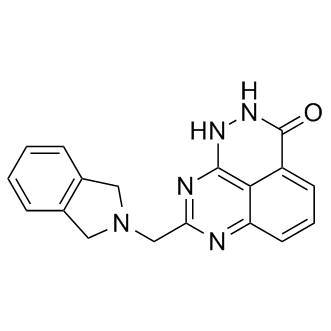| References: |
E7449 is an orally bioavailable, potent, small molecule inhibitor of PARP1 and PARP2; enhances the efficacy of radiotherapy and chemotherapy and has potent single agent anticancer activity in BRCA-deficient tumors.
E7449 is an orally bioavailable, potent, small molecule inhibitor of Poly(ADP-ribose) Polymerase (PARP)1 and PARP2. E7449 potently inhibits PARP1 and PARP2 in a cell-free assay and potentiates the cytotoxicity of both radiotherapy and chemotherapy. The cytotoxic effect of radiotherapy was enhanced by E7449 in clonogenic survival assays.
The anti-tumor activity of the alkylating agent temozolomide was potentiated by E7449 in a dose responsive manner in vivo in the B16-F10 melanoma isograft mouse model. Daily dosing of E7449 as a single agent significantly inhibited tumor growth in a genetically engineered BRCA1 null mouse ovarian xenograft model. In the BRCA1 mutant human breast cancer cell line MDA-MB-436, E7449 significantly inhibited proliferation in a long term growth inhibition assay in vitro. Oral administration of E7449 once daily potently inhibited tumor growth in the MDA-MB-436 xenograft model with no toxicity observed. A dose responsive pharmacodynamic effect on PARP activity was demonstrated in MDA-MB-436 tumor tissue following administration of a single E7449 dose. The decrease in PARP activity was sustained over several hours. The ability of E7449 to inhibit PARP activity in tumor tissue was further investigated in the H460 xenograft model. Following single oral administration of various E7449 dosages, inhibition of PARP activity in tumor tissue was determined over time. Studies revealed that PARP is inhibited by E7449 in a time and dose dependent manner with lower doses resulting in transient inhibition and higher doses causing more complete and sustained PARP inhibition. Conclusion: E7449 is a potent and selective PARP1 and PARP2 inhibitor with potent anti-tumor activity in BRCA-deficient in vivo models. It also potentiates the activity of radiotherapy and chemotherapy pre-clinically. Evaluation of E7449 in a Phase 1 study will be initiated soon. |























